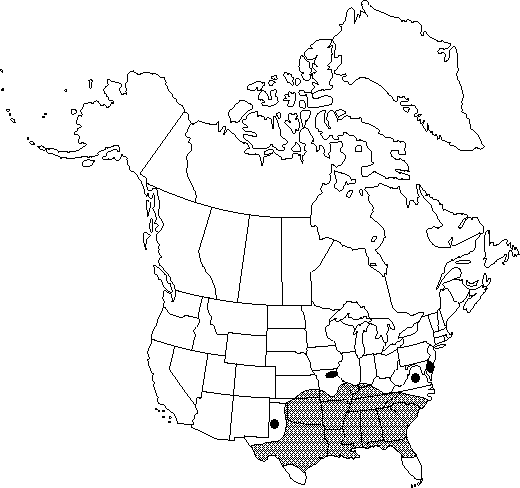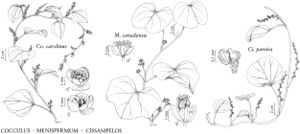Difference between revisions of "Cocculus carolinus"
Syst. Nat. 1: 524. 1818.
FNA>Volume Importer |
FNA>Volume Importer |
||
| Line 12: | Line 12: | ||
|label=Selected by author to be illustrated | |label=Selected by author to be illustrated | ||
}} | }} | ||
| − | |basionyms={{Treatment/ID/ | + | |basionyms={{Treatment/ID/Basionym |
|name=Menispermum carolinum | |name=Menispermum carolinum | ||
|authority=Linnaeus | |authority=Linnaeus | ||
| + | |publication_title=Sp. Pl. | ||
| + | |publication_place=1: 340. 1753 | ||
}} | }} | ||
|synonyms={{Treatment/ID/Synonym | |synonyms={{Treatment/ID/Synonym | ||
| Line 58: | Line 60: | ||
|publication year=1818 | |publication year=1818 | ||
|special status=Selected by author to be illustrated | |special status=Selected by author to be illustrated | ||
| − | |source xml=https://jpend@bitbucket.org/aafc-mbb/fna-data-curation.git/src/ | + | |source xml=https://jpend@bitbucket.org/aafc-mbb/fna-data-curation.git/src/f6b125a955440c0872999024f038d74684f65921/coarse_grained_fna_xml/V3/V3_301.xml |
|genus=Cocculus | |genus=Cocculus | ||
|species=Cocculus carolinus | |species=Cocculus carolinus | ||
Revision as of 20:53, 24 September 2019
Vines, to 5 m or more; rhizomes to 1.4 cm diam. Stems with spreading pubescence. Leaves: petiole to 10 cm. Leaf blade generally ovate or deltate, sometimes sagittate or hastate, to 17 × 14 cm, membranous to leathery, base sometimes with 3-5 lobes, margins usually entire, apex acuminate to rounded, then often retuse, mucronate; surfaces abaxially slightly pale, rarely glaucous, sparsely to densely pilose, adaxially glabrous to sparsely pilose; venation 5. Inflorescences to 22 cm; bracteoles often present; rachis glabrous or tomentose, not glaucous. Flowers: perianth parts not glaucous; sepals in 3 series, outer sepals 0-3, ovate, 0.3-1.4 × 0.2-0.8 mm, pilose, middle 3 sepals ovate to elliptic or obovate, 1-3 × 0.6-2 mm, glabrous to pilose, inner 3 sepals elliptic to nearly orbiculate or obovate, 0.8-3 × 0.8-2 mm, glabrous to sparsely pilose; petals (5-)6, yellow, elliptic, deltate, rhombic, obovate, or nearly orbiculate, 0.6-2 × 0.4-1.4 mm, glabrous. Staminate flowers: stamens (5-)6, to 2.2 mm; pistillodes to 0.5 mm. Pistillate flowers: staminodes to 0.8 mm; pistils to 2 mm. Drupes red, 5-8 mm diam. 2n = 78.
Phenology: Flowering late spring–early fall.
Habitat: Woodland and shrub borders, along streams, fencerows, waste places
Elevation: 0-500 m
Distribution

Ala., Ark., Del., Fla., Ga., Ill., Ind., Kans., Ky., La., Miss., Mo., N.C., Okla., S.C., Tenn., Tex., Va., Mexico.
Discussion
Cocculus carolinus was used by some Native American tribes medicinally to treat blood ailments (D. E. Moerman 1986).
Selected References
None.
